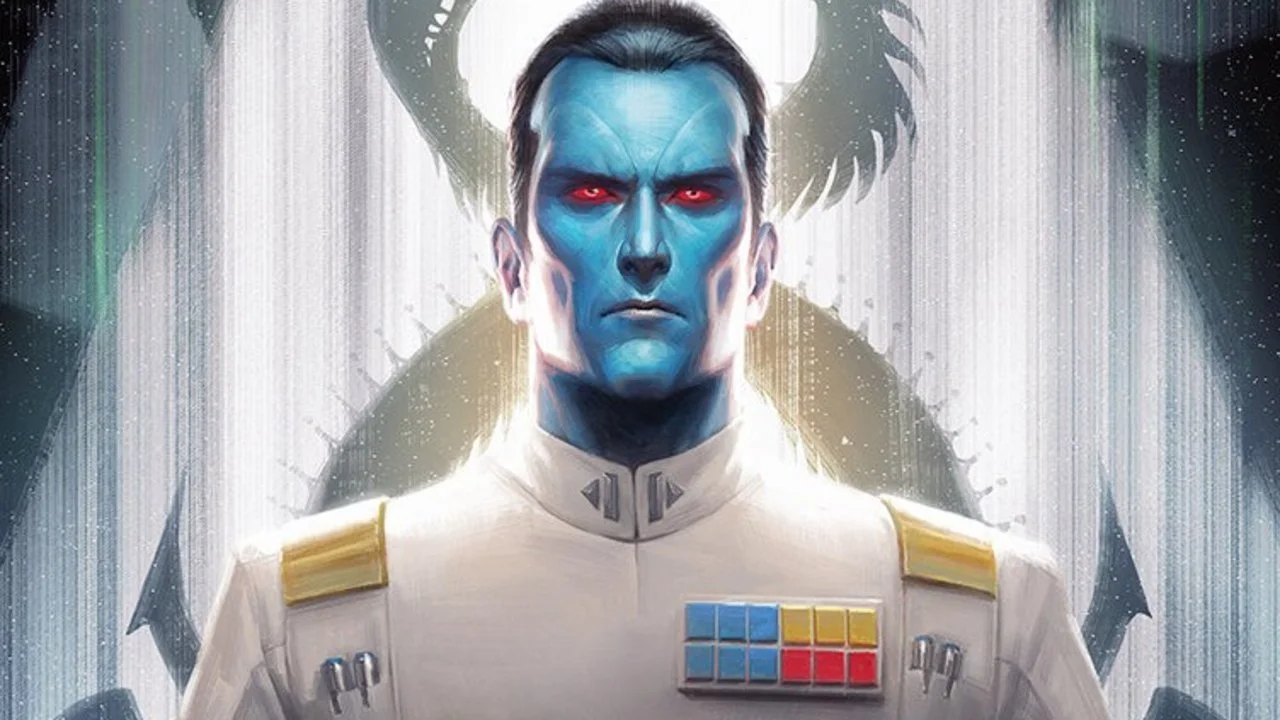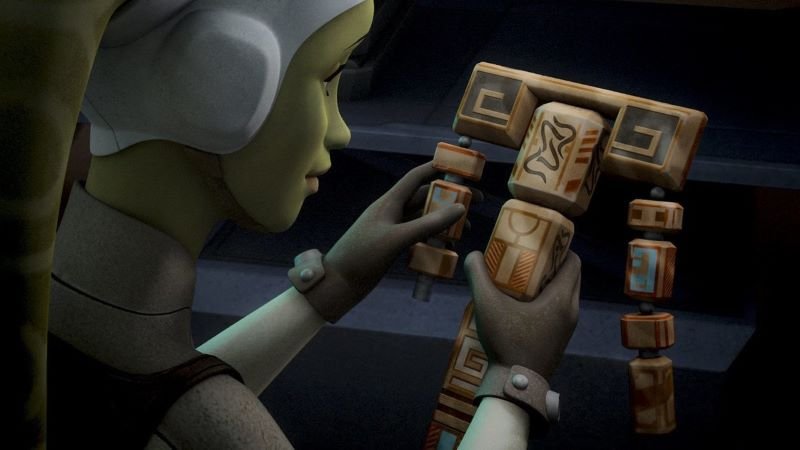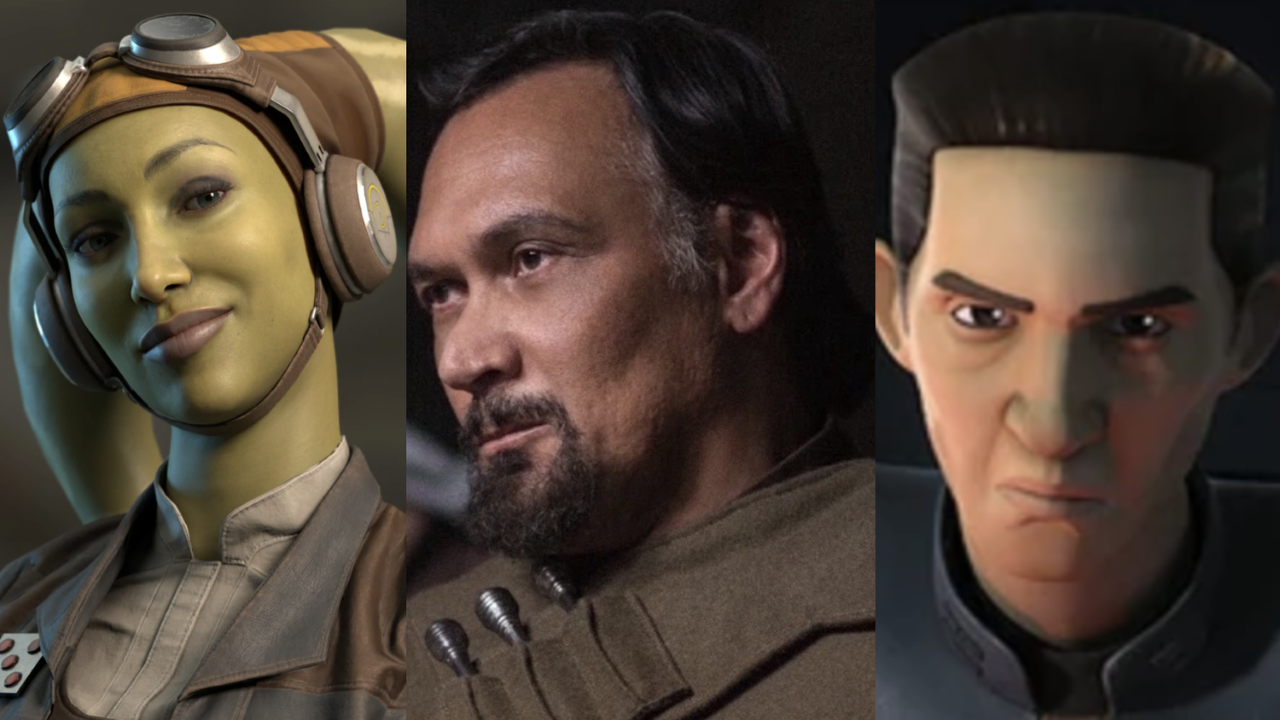5 Pieces Of Wisdom From Grand Admiral Thrawn
Image Source: MovieWeb
Few villains in the Star Wars saga stand out like Grand Admiral Thrawn, who, since his debut in Timothy Zahn’s Heir To The Empire series, has amazed and delighted countless Star Wars fans with his ruthless attitude, cool demeanor, and, most of all, his military genius.
He is somewhat of a Star Wars Sun Tzu. From Legends books to canon television shows, Thrawn has never been short on tidbits of mind-blowing wisdom, but for the sake of brevity, here is a list of five.
Hera Syndulla’s family heirloom, a Kalikori, which Thrawn used to uncover her identity.
Image Source: StarWars.com
“Learn about art, Captain. When you understand a species’ art, you understand the species.”
Thrawn’s more cultured way of saying “know your enemy” and, arguably, his most famous quote. As a military strategist and leader, Thrawn knew that understanding one’s enemy was the key to defeating them and gaining victory. But what does art have to do with war and battlefield tactics?
RELATED:
Art, whether intentionally or not, always betrays something of the artist’s mindset, beliefs, and ways of thinking. Likewise, a nation’s artworks of cultural and historical significance say something about that country’s history, values, and culture. What are a nation’s most and least popular art styles? Why? How are the artworks structured and arranged? What historical and mythological figures are portrayed, and what do those figures represent? Pacifists and scholars or warmongers and destroyers? By providing an insight into the heart of a nation, one also gains an insight into the heart of its people—what they’ll fight for, why they fight, and even how they fight.
Thrawn demonstrated this in Timothy Zahn’s Heir To The Empire when he used a common war tactic (the Marg Sabl) against a fleet of Elomin aliens, utterly annihilating them. Thrawn was able to accomplish this feat through his past study of Elomin art, which was rife with lines, symmetry, and repetitive patterns. This reflected the species’ rigid and linear way of thinking. As such, they were psychologically incapable of defending against the Marg Sabl, which is completely unstructured and non-linear.
This is not so much advice on using art to blow up spaceships (CultureSlate does not endorse intergalactic warfare), but rather an insight into how learning to understand the psyche and values of one’s “enemy” can be greatly beneficial to one’s chances of victory and success. As Sun Tzu said, “He who knows himself and his enemy need not fear the result of 100 battles.”
Thrawn and Eli Vanto weigh the risks of a dangerous mission in Marvel’s Thrawn #5
Image Source: Star Wars News Net
“Risk has always been an inescapable part of warfare.”
The last quote talked about study and planning, but here’s the other side of that coin—risk. Regardless of how tactically savvy or well-equipped a commander is, risk is an ever-present threat. The commander in question has made plans, but what about backups? They might have soldiers, but are all the soldiers equally capable? And what of loyalty? Are all those under the commander’s service loyal and willing, or are they secretly planning his downfall? Or worse still, serving and spying for the enemy?
Plans, capability, loyalties, armaments, sabotage, even sheer luck, Thrawn recognized that anything could change on the battlefield and everything carries risk. This is true not only in warfare but in all walks of life as well. Relationships, business, finance, work, family, friendships, and health. Any area of life that requires some kind of care, planning, the involvement of other people, or human error, is always liable to risk. One should make not only life plans but also life audits and assessments. What do you want? Why do you want it? Want plans are you making to achieve this goal? And what risks are you willing to take or not take?
Of course, one cannot completely eliminate risk, but that doesn’t mean one should be careless either. As long as one keeps their goals and aspirations in sight while also being mindful of any potential problems and adverse effects, then everything else should fall into place.
Thrawn with Eli Vanto, arguably one of Thrawn’s closest friends in all of the galaxy.
Image Source: retrozap
“A friend need not be kept within sight or within reach. A friend must be allowed the freedom to find and follow his own path. If one is fortunate, those paths will, for a time, join. But if paths separate, it is comforting to know that a friend still graces the universe…For if one is remembered by a friend, one is never truly gone.”
This is a rather sentimental quote for someone like Thrawn, but an important one nonetheless. As a military leader, it was important for Thrawn to understand how people work and how they can be inspired, controlled, led, improved, and used to achieve the proper ends. In short, it was important for Thrawn to understand human (or alien) relationships with one another, especially friendship.
During his early years in the Imperial Academy, Thrawn had few friends as a Chiss alien in an academy with outspoken anti-alien views. He made sure to treasure any friendships and alliances he had, but as soldiers in a galaxy-wide armada, staying together with one’s friends was not an option for Thrawn or any other officers. They had to remain content with hoping to see their friends again at some point in the future or make new ones.
This is often true in real-world friendships as well. How many times in life has one made friends, only to be driven apart at some point? Whether it be through circumstance, one seems to be losing friends than actually making them. However, if one stops focusing on the friends that they have lost and those that they have maintained, then one can feel much less lonely. Even if those friends are far from you, they are still friends. They are still people that want you in their lives and vice versa, and thus, people that should be respected, treasured, and, as Thrawn says, immortalized.
The Battle of Jakku, the Imperial “defeat'“ that signaled the end of the Galactic Empire (or so many thought…)
Image Source: YouTube
“No one is immune to failure. All have tasted the bitterness of defeat and disappointment. A warrior must not dwell on that failure, but must learn from it and continue on.”
Reading this sentence can summon all sorts of insecurities and unpleasant memories. Of all the experiences human beings can share, encountering failure is the most universal. Whether it be in pursuit of a dream, goal, hobby, or personal relationship, at some point, a brush or clash with failure or some kind of mistake is inevitable. While failure might be inevitable, it does not have to be the end if one has the strong will to continue.
Thrawn was a person who had come far in the Empire and life, so it is fair to assume that he made his fair share of mistakes. After all, no one is automatically born brilliant. That has to come through a process and dedication with the risk of mistakes and failure at some point. Rather than let himself be defined by his failures, Thrawn persisted, working his way up from a native of the Chiss Ascendancy to one of the most dedicated officers of the Galactic Empire.
As Thrawn reminds us, any warrior (or, well, person) must not linger on the failures they have endured or their mistakes, but rather on the progress they have made, what can be learned from those failures, and how one can use those lessons to propel themselves towards success. Failure is not the end, you see. It is merely a humble speedbump on the journey toward success.
Thrawn would go on to be recognised as one of the greatest leaders in the Imperial Empire in both canon and Legends.
Image Source: Polygon
“Leadership is a role and task that should never be aspired to lightly. Neither should loyalty be given without reason.”
Whether it be the dangers of politics and bureaucracy, the dangers of blind loyalty to a creed, or simply allowing yourself to be led by your feelings rather than your mind, the Star Wars saga is a cautionary tale in leadership and loyalty.
Thrawn held the position of Grand Admiral, the highest position in the Imperial Military (barring Emperor Palpatine and Darth Vader, of course). Thus, he understood the trappings and weight his office thrust upon him. In short, the Chiss understood that any high level of office, be it social, military, or political, should not be held by individuals of weak resolve and fortitude and definitely not by individuals driven by a lust for power or malice. On top of that, Thrawn also understood that being a leader did not automatically give someone loyal followers and subordinates. That loyalty had to be earned.
In a world where most leaders are too far to either side of the political spectrum, and few seem interested in politics beyond the “power” it gives someone, this quote from Thrawn is all the more relevant. In a world of strife and uncertainty, people with the capacity to actually lead should aspire to positions of leadership to earn loyalty from people rather than demand it. As the saying goes, a ruler rules, a boss bosses around, but a leader leads.
READ NEXT:


















